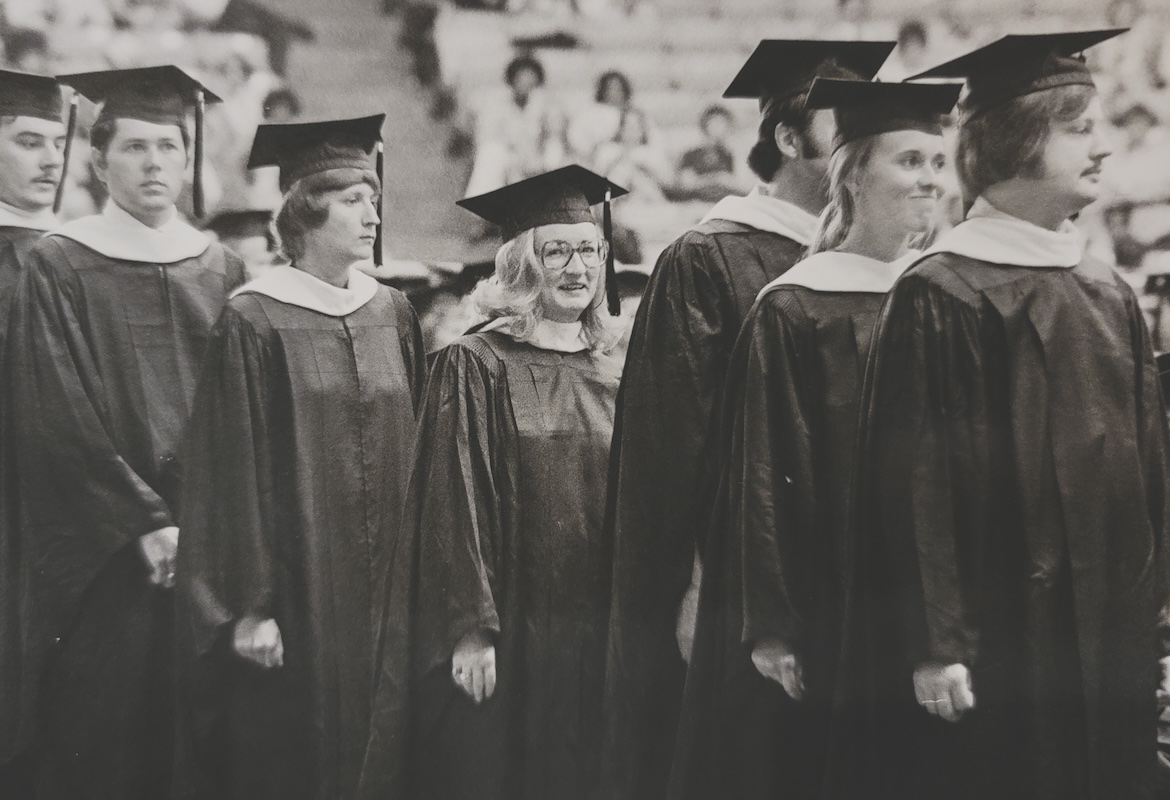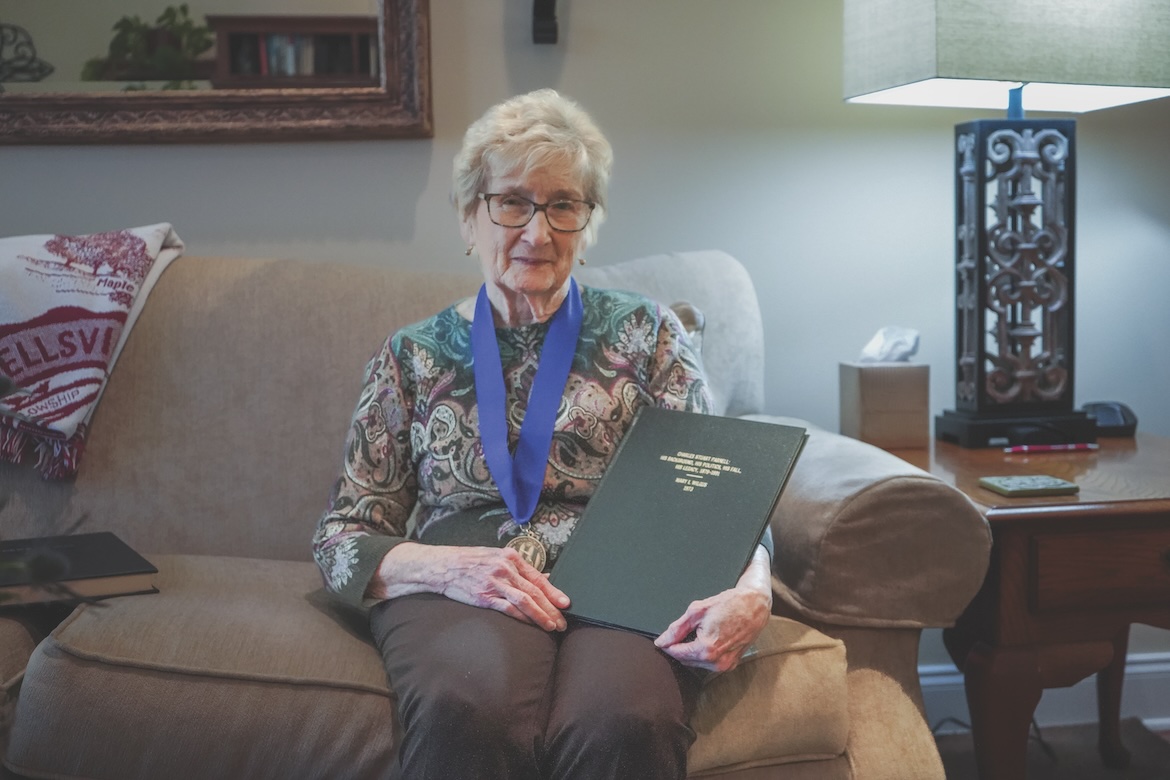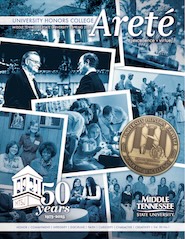
Married mom of five completed MTSU undergraduate program’s first thesis 50 years ago
At age 27, Mary Wilgus was married and raising five children when she started college in the early 1970s. In fact, she was at MTSU when the Honors Program was first created 50 years ago. The now-retired History professor made her own mark in history when she completed the University’s first Honors thesis in 1973.
“I didn’t even know I was the first,” she said with a laugh. Wilgus was one of 129 students who chose to take an Honors class the first semester of the program.
Formerly Mary Hargan, she married military and commercial pilot James Wilgus in 1962.
“I had always wanted to go to college. Once all the kids were in school, I decided to give it a try,” she said. She recalled sitting at a counter in her kitchen doing her homework next to her children doing their own. “I thoroughly enjoyed the challenge, and I think we helped challenge each other.”
Wilgus had already started her studies at MTSU when Fred Colvin, a History professor, asked if she would be interested in the Honors Program. She completed a double major in 1974, earning her bachelor’s degree in History and International Relations, along with a minor in German.
While working as a teaching assistant in MTSU’s History Department, Wilgus continued her education and in 1976 earned a master’s focusing on European history. She went on to finish her Ph.D. in History at Vanderbilt University, studying British imperial history, modern England, and East Asia. While completing her doctorate, she also taught history at MTSU for two years as an adjunct instructor.
Don’t let anyone tell you that you can’t do something.
Passion to Teach
In 1985, Wilgus began working full time as a history professor and chair of the Social Sciences Division at Lees-McRae College in North Carolina. There, she was able to teach many first-generation college students, who she said were very dedicated.
“I really enjoyed teaching there. I feel that you learn more while you are teaching,” she added.
Wilgus said her first job offer actually came from Time-Life, shortly before she completed her Ph.D. “The recruiter was looking for people who were able to research, write, and edit. But I didn’t want to move to New York,” she said.
While in North Carolina, Wilgus became a published author with a book titled Sir Claude MacDonald, the Open Door, and British Informal Empire in China, 1895–1900.
In 1997, Wilgus took a job at Campbellsville University in Kentucky, then served as dean of the College of Arts and Sciences there from 1999 until retirement in 2013.
“I enjoyed the classroom and working with students,” Wilgus said. She credited her passion for teaching to her experience as an adjunct at MTSU.
Breaking Barriers
Wilgus, who is of Scottish and Irish descent, said she chose her Honors thesis topic because she was already interested in that area of history. It was titled “Charles Stuart Parnell: His Background, His Politics, His Fall, His Legacy, 1879–1891.” In fact, each of her thesis topics would focus on individuals who were part of British history.
“Charles Parnell was a troublemaker, and that fascinated me,” she quipped, admitting that she initially couldn’t remember the topic until being contacted about being the first student to defend an Honors thesis at MTSU.

Attending college as a wife and a mother in the 1970s was not unheard of, but it did make her a nontraditional student. Throughout her educational journey, she remained motivated and passionate about history and teaching. However, this journey wasn’t always easy. While working on her doctorate, she had a professor tell her she shouldn’t be there because she was a woman who was already a wife and mother.
“I showed him!” exclaimed Wilgus, who received straight A’s throughout the program. “Don’t let anyone tell you that you can’t do something. No matter your age, if something seems out of reach, keep reaching.”
Wilgus received numerous awards and honors during her career, beginning with the Ethel Mae Wilson Research Grant in 1981 and winning a graduate history paper competition at Vanderbilt in 1987. Later recognitions included the Humanities Scholar from the Appalachian Consortium in 1988 and the Edgar Tufts Teaching Excellence Award at Lees-McRae College in 1990.
Building Bridges
In 2012, she received Campbellsville University’s Racial Recognition Award, given to those who show “servant leadership in bringing people together across lines of race and ethnicity and who have worked as bridge builders in the community,” according to Columbia (Ky.) Magazine. Wilgus worked directly with the Rev. John E. Chowning to initiate the university’s Dialogue on Race program, which she led and built for more than a decade and from which she retired as leader.
The very acts of participating in intentional discussions around race, ethnicity, nationality, and gender help in the work of bringing about better relations.
“I worked with first-generation Black students. The very acts of participating in intentional discussions around race, ethnicity, nationality, and gender help in the work of bringing about better relations,” she said.
Wilgus said she enjoyed teaching African American history. She recalled a Black pastor with whom she co-taught the course: “He brought a different approach to the class. It was very interesting, and I found myself taking notes from him.”
She and her husband invited students from the program who were majoring in History to their home for dinner on several occasions.
“It was a lot of fun, and I appreciated the time I spent with the program,” she said.
Fifty years after Wilgus’ inaugural undergraduate thesis at MTSU, a thesis or creative project still is required of every student who graduates from the University Honors College. The purpose is to prepare the student for graduate or professional school, offer an opportunity to complete a scholarly or creative project of significant proportions, and provide a new perspective on knowledge by contributing to recognized knowledge in a particular field of study.
“I am very proud to be a part of history,” Wilgus added. “I enjoyed every minute of my education, except for finals!”
For more information on the Honors College, visit mtsu.edu/honors.



COMMENTS ARE OFF THIS POST